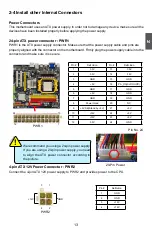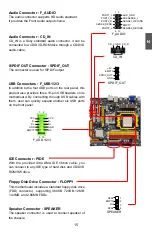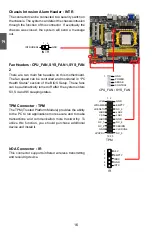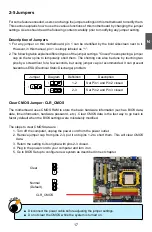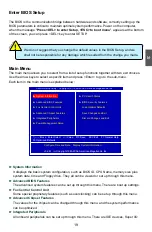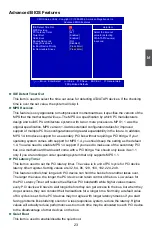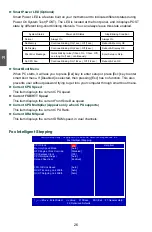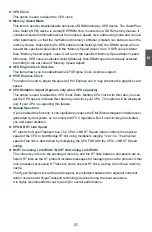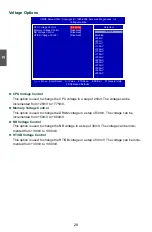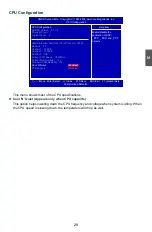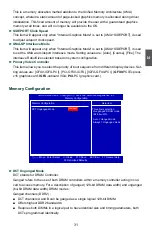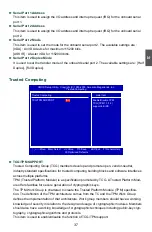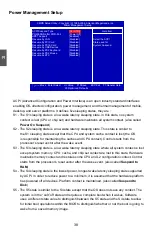
27
3
► CPU Clock
This option is used to adjust the CPU clock.
► Memory Speed Mode
This item is used to enable/disable provision of DRAM timing by SPD device. The SerialPres-
ence Detect (SPD) device is a small EEPROM chip, mounted on a DDR2 memorymodule. It
contains important information about the module’s speed, size, addressing mode and various
other parameters, so that the motherboard memory controller (chipset) can better access the
memory device. Select [Auto] for SPD enable mode.Select [Limit], the DRAM speed will not
exceed the specified value listed in the “Memory Speed Adjust” item. If SPD value is faster
than “Memory Speed Adjust” value, it will run at the specified “Memory Speed Adjust” speed.
Otherwise, SPD value is selected.Select [Manual], then DRAM speed is manually selected
according to the set value of “Memory Speed Adjust”.
► GFX Engine Clock Override
This item allows you to enable/disable GFX Engine Clock Override support.
► PCIE Express Clock
This option is used to adjust the speed of PCI Express slot. It may enhance the graphics card
speed.
► CPU Multiplier Adjust (Appears only when CPU supports)
This option is used to adjust the CPU Clock Ratio. Multiply CPU clock with this ratio, you can
get the CPU speed. Increase this ratio may overclock your CPU. This option will be displayed
only if your CPU is supporting this feature.
► Spread Spectrum
If you enabled this function, it can significantly reduce the EMI (Electromagnetic Interference)
generated by the system, so to comply with FCC regulation. But if overclocking is activated,
you had better disable it.
► CPU-NB HT Link Speed
HT stands for HyperTransport bus. The CPU<->NB HT Speed option controls the physical
speed of the CPU to Northbridge HT link using multipliers ranging 1x to 13x. The physical
speed of the link is determined by multiplying the CPU FSB with the CPU<->NB HT Speed
setting.
► NCHT Incoming Link Width / NCHT Outcoming Link Width
The coherency refers to the caching of memory, and the HT links between processors are co-
herent HT links as the HT protocol includes messages for managing the cache protocol. Other
(non processor-processor) HT links are Non-Coherent HT links, as they do not have memory
cache.
The HyperTransport link width and frequency are initialized between the adjacent coherent
and/or noncoherent HyperTransport technology devices during the reset sequence.
It is highly recommended to set to [Auto] for overall performance.

